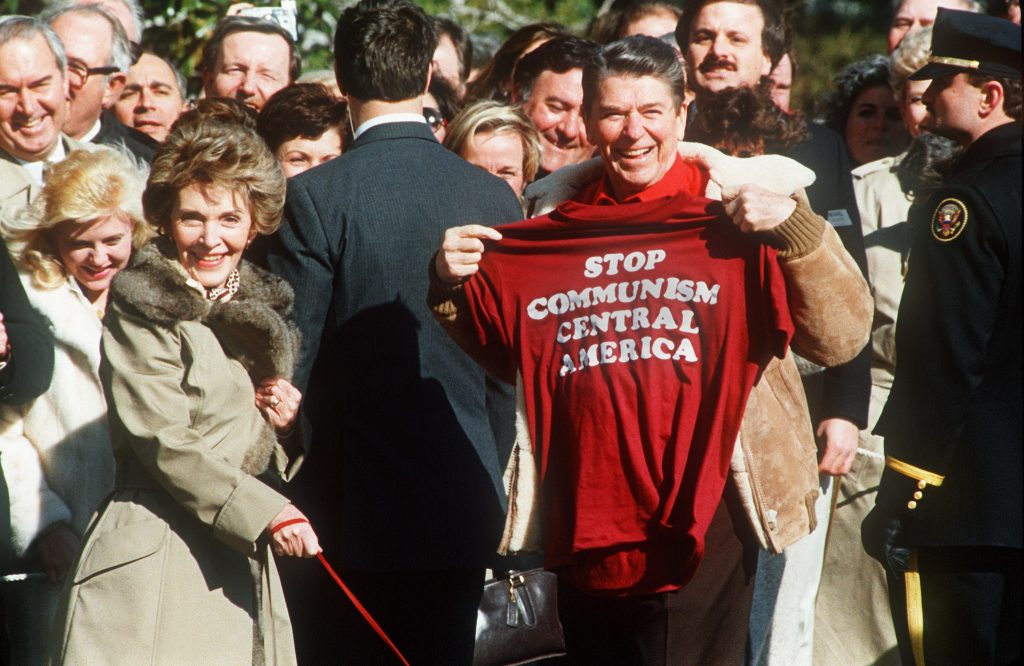By: Terresa Monroe-Hamilton

For several decades now, Michael Johns and J. Michael Waller have ranked among the conservative movement’s most high-profile and influential foreign policy and national security experts, helping shape high-level American positions on some of the most complex and challenging threats confronting the United States both during and following the end of the Cold War.
Until recently, however, both Johns and Waller remained largely silent about their incredibly bold and intriguing experience as college students when, together, they were among only a very few Americans to visit the frontlines of Nicaragua’s civil war, where the Soviet Union, Cuba, and Nicaragua’s communist regime were facing growing military opposition from the U.S.-backed anti-communist resistance forces, known as the contras, in one of the Reagan Doctrine’s highest-profile and most consequential Cold War conflicts.
In January 1984, Johns, then a University of Miami student, and Waller, a George Washington University student, were granted access to the contras’ primary base camp on the frontlines of this now historic Cold War conflict.
Appearing on One America News (OAN) a few weeks ago, Johns and Waller both opened up to OAN prime time host Kara McKinney about the historic 1984 visit. The segment is hugely compelling and can be seen here in its entirety: “Contras in Nicaragua with J. Michael Waller and Michael Johns,” One America News, March 25, 2021.
Michael Johns on visiting the contras:
“We were intrigued by geopolitics, very committed to the Reagan vision of a strong America in the world and also anti-communism and sympathy and support for those who were rising up globally against it. That ultimately came to formulate what was known as the Reagan Doctrine, which was a centerpiece of American foreign policy from the mid-1980s until the end of the Cold War in 1991. The operating thesis—which was widely embraced by conservatives and Republicans and widely resisted by progressives at the time–was that the U.S. should be supporting those individuals who rise up against repressive communist regimes as part of our Cold War struggle…Nicaragua was the centerpiece to that. It was probably the most contentious and high profile of all those conflicts, and we had the opportunity to be one of the few Americans who got out into the base camps of the contras. We heard their stories individually and from a leadership standpoint, and we both went on to champion support for the contras and the broader Reagan Doctrine policy,” Johns said in the OAN segment.
Michael Waller on visiting the contras:
“We were supporting President Reagan. I was working here in Washington, D.C., and Mike was down at Miami. The left was very strong back then supporting the communists in Nicaragua and doing everything possible to prevent President Reagan from resisting them. The Soviet Union was expanding its presence around the world to choke us off, to cut off our supply lines, our sea lines of communication, and in our own hemisphere it had expanded its nuclear bomber base in Cuba, which it still uses today, flying its Tu-95 bombers off our Atlantic Coast, and its intelligence station there that the Chinese have now and supporting third world insurgencies; these were communist guerrilla and terrorist movements and subversive political movements that were working with them in an extremely well-run intelligence operation that was run by the Cubans under Soviet control. To get a Soviet foothold on the mainland of the Americas would be a mortal blow to our country…so supporting the Nicaraguan contras was key…,” Waller added in this OAN segment.
In the many years since their largely untold collegiate visit to this vital Cold War conflict, both Johns and Waller have gone on to prominent and influential roles in public policy, academia, government, and the private sector.
Biography: Michael Johns
As a foreign policy analyst at The Heritage Foundation, Johns led the foundation’s Reagan Doctrine initiatives and spent time on the frontlines of most of the world’s anti-communist resistance movements aided under the Reagan Doctrine. He returned to Central America in 1988 to assist contra military commander Enrique Bermudez in authoring his autobiographical essay, “The Contras’ Valley Forge: How I View the Nicaragua Crisis.” (Bermudez was later assassinated in February 1991 in Managua).
Johns also supported and visited Jonas Savimbi’s UNITA forces in Angola (Savimbi was killed in a firefight with Angola’s communist forces in 2002) and with the coalition forces in Cambodia that were engaged in opposing both Khmer Rouge forces and the Vietnamese-back government.
Johns went on to direct global programming at the International Republican Institute (IRI) and to serve as a senior aide to a Republican governor and senator, a White House presidential speechwriter, and one of the February 2009 co-founders and strategists in the immensely influential U.S. Tea Party movement, widely credited with the Republican victories in the U.S. House in 2010, the U.S. Senate in 2014, and in paving the way for former President Trump’s populist campaign victory in 2016. He has written for The Wall Street Journal, The Christian Science Monitor, National Review, and other global and national media.
Biography: J. Michael Waller
Waller is a senior analyst at the Center for Security Policy and a former professor and instructor at the Institute of World Politics, the Naval Postgraduate School, and the John F. Kennedy Special Warfare Center and School at Fort Bragg. He holds a Ph.D. in international security affairs from Boston University and has written for The Wall Street Journal, USA Today, The Los Angeles Times, and other global and national media.

















